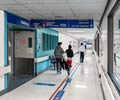The death toll resulting apparently from hospital infection has risen to 18 in a hospital UK. The hospital authorities, however, have promised, necessary measures to improve the situation.
A UK hospital has reported a further death linked to the superbug Clostridium// difficile (C-diff).
Clostridium difficile is a bacterium that causes diarrhea and more serious intestinal conditions such as colitis.
It brings to 18 the number of deaths at the James Paget University Hospital (JPH), Gorleston, linked to the bug since the start of December - another seven people have had to undergo major bowel surgery.
In a statement issued last night, the hospital said four patients have active C-diff and these are being nursed in isolation facilities.
Of the 18 deaths, 11 had C diff recorded as a primary cause of death and seven as a contributory cause.
Of the 17 patients who died, the majority were over 65 and some in their 80s. Of the five who had surgery to alleviate the worst symptoms, several are said to have recovered and left the hospital.
Doctors said that the fit and healthy had little to fear from the bug but those patients in hospital or outside who had been taking antibiotics were at risk because of imbalances in the gut brought on by taking the drugs.
Staff began to focus on the C-diff problem in December when they detected a rise in cases and that patients were experiencing worse symptoms than the normal diarrhea.
Subsequent tests on bacteria cultures showed that the hospital was contending with the dangerous 027 strain of the bug, only identified four years ago in North America.
Following stories in national papers alleging dirty wards at the JPH, new chief executive Adrian Pennington has moved to reassure the public in the past week.
The hospital has invested an extra £400,000 in an intensive cleaning program with bleach, known to kill the bug, and additional cleaners have been taken on in the last couple of months.
Mr Pennington said: “In health terms, C-diff is relatively new and clearly a lot of clinical research is needed to understand how it works.
“As a result, nobody really knows how long outbreaks tend to last for, but we hope over the next few weeks to see an improvement.”
The JPH has emphasised the need for people in the hospital to wash with soap and water because the normal hand gel does not work against C-diff.
Visitors are also being asked to stick to visiting times with no more than two people at a bed at any time.
When the disease broke out elsewhere in the UK, calls had been made for installation of more sinks at hospital entrance to ensure handwash and use of hydrogen peroxide and steam cleaning as a double attack on the bug.
Critics also charged that the government was letting down patients relying on the National Health Service for treatment by its indifference to hospital hygiene.
In February last, following reports of a sharp increase in deaths from hospital infections in that country, Lord Hunt of Kings Heath, the Health Minister had declared that a tough regime of hygiene and infection control was being put in place.
Apparently it will be a long while before things are set right, it is felt.
Source-Medindia
SRM







